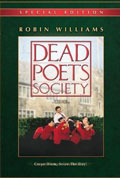
Directed by
Peter Weir
128 minutes
Rated M
Reviewed by
Bernard Hemingway

Dead Poets Society
Dead Poet’s Society offers up the type of sentimental "inspirational" hokum that Hollywood and mainstream America loves but it had the misfortune to be released the same year as Driving Miss Daisy or else it could well have picked up the Best Picture Oscar for which it was nominated. It did however win Best Original Screenplay for Tom Schulman which shows a very loose interpretation of the word "original" as it is a descendant of 'Goodbye, Mr Chips' (originally filmed in 1939, then again as a musical in 1969) re-shaped for a latter-day audience brought up on the cinematic myth of non-conformist individualism. Director Peter Weir rams the message home mercilessly, albeit with polished craftsmanship, in what is a handsome production with seductive photography by John Searle
Robin Williams, in a role which was originally intended for Dustin Hoffman (who apparently was intending to direct), plays his typical charismatic, system-bucking persona as Mr John Keating, a former pupil at an elite East Coast secondary college who returns as an English teacher. His mission is to teach the students to think for themselves and to love poetry and life. Despite his good intentions, however, the consequences of his example are fatal.
The spirit’s the thing as they say but although it appears to be about the non-negotiable necessity for individual autonomy Schulman’s script is superficial in its feelgood rhetoric. Unlike Cool Hand Luke (1967) for instance, it fails to penetrate to the heart of the matter and whilst setting up repressive 1950s patriarchy as the evil force of conformism simply substitutes for it a cult of personality that runs through the film from the first shot we see of the impish Mr Keating to the final triumphalism of the “Captain, O my Captain” address of the students to him. But non-conformism isn’t that easy and the film fails to purse the choices of the only two real non-conformists, Neil Perry (Robert Sean Leonard) and Charlie “Nuwanda” Dalton (Gale Hansen) for a resolution of glib bombast. Still, it worked fabulously at the box office taking over $235m worldwide (the road of sentimentality is paved with gold) and the film remains a popular favourite.
Want something different?





